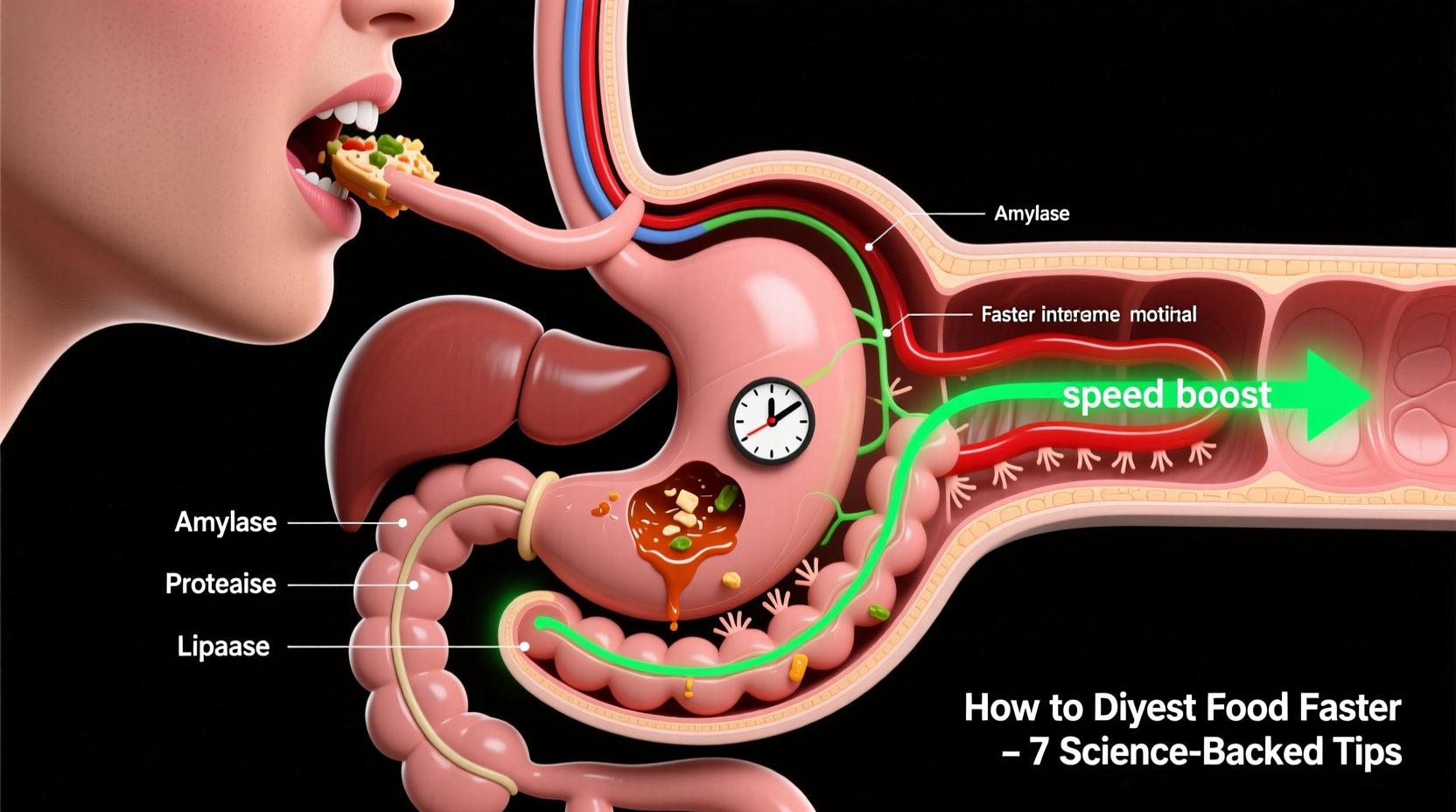Based on current medical understanding, you can't dramatically speed up your natural digestion process, but you can support healthy digestion through specific evidence-based methods. The most effective approaches include staying hydrated, eating mindfully, incorporating gentle movement after meals, and choosing digestion-friendly foods. These strategies work with your body's natural processes rather than forcing unnatural acceleration, which could potentially cause harm.
Understanding Your Digestive Timeline
Your digestive system follows a natural timeline that can't be significantly shortened without medical intervention. According to the National Institute of Diabetes and Digestive and Kidney Diseases, complete digestion typically takes 24-72 hours. Rather than trying to rush this complex biological process, focus on supporting your body's natural digestive capabilities.
Practical Strategies for Healthier Digestion
Before Your Meal: Preparation Matters
Your digestive process begins before food even enters your mouth. The cephalic phase of digestion triggers saliva and stomach acid production when you anticipate eating.
- Start with digestive teas - Ginger or peppermint tea 10-15 minutes before eating stimulates digestive enzymes according to research published in Evidence-Based Complementary and Alternative Medicine
- Practice mindful eating preparation - Take 2-3 deep breaths before eating to activate your parasympathetic nervous system, which optimizes digestion
- Include bitter foods - A small salad with arugula or radicchio before meals can stimulate bile production
During Your Meal: Eating Habits That Help
How you eat matters as much as what you eat when supporting healthy digestion.
- Chew thoroughly - Aim for 20-30 chews per bite to properly break down food and reduce digestive workload
- Manage portion sizes - Overeating stresses your digestive system; try the "plate method" with appropriate portions
- Limit liquids during meals - Excessive fluids can dilute stomach acid; sip moderately rather than drinking large amounts
- Combine foods wisely - Pair protein with non-starchy vegetables rather than heavy starch combinations
After Eating: Gentle Support for Digestion
What you do after meals significantly impacts your digestive comfort and efficiency.
- Take a gentle 10-15 minute walk - Light movement stimulates intestinal contractions without diverting blood flow from digestion
- Avoid lying down immediately - Wait at least 2-3 hours before reclining to prevent acid reflux
- Try specific post-meal positions - For heartburn relief, sleeping on your left side can reduce reflux symptoms
- Consider herbal support - Fennel or chamomile tea after meals may reduce bloating based on National Institutes of Health research
| Food Type | Typical Digestion Time | Digestion-Supporting Pairings |
|---|---|---|
| Lean proteins (chicken, fish) | 1.5-2 hours | Lemon, herbs, non-starchy vegetables |
| Complex carbohydrates (quinoa, sweet potato) | 2-3 hours | Healthy fats, leafy greens |
| Fats (avocado, olive oil) | 2-4 hours | Acidic components like vinegar |
| High-fiber foods (beans, cruciferous vegetables) | 3-4+ hours | Herbs like rosemary, cumin, or digestive spices |
Lifestyle Factors for Long-Term Digestive Health
Consistent habits make the biggest difference in maintaining healthy digestion over time.
- Maintain hydration throughout the day - Aim for 8-10 glasses of water daily, but avoid excessive amounts during meals
- Manage stress levels - Chronic stress significantly impacts gut motility and enzyme production
- Establish regular meal times - Consistency helps regulate your digestive rhythm
- Consider probiotic-rich foods - Yogurt, kefir, and fermented vegetables support gut microbiome balance

What Doesn't Work (And Could Harm You)
Many popular "quick fixes" for speeding digestion are ineffective or potentially dangerous:
- Excessive water drinking during meals - Dilutes stomach acid needed for proper protein breakdown
- Enzyme supplements without medical need - Can disrupt your body's natural enzyme production
- Extreme fasting after overeating - Creates additional stress on your digestive system
- Over-reliance on laxatives - Leads to dependency and electrolyte imbalances
Important Context: When These Methods Won't Help
Understanding the limitations of natural digestion support is crucial. These strategies work best for generally healthy individuals experiencing occasional digestive discomfort. They won't help with:
- Medical conditions like gastroparesis or irritable bowel syndrome
- Digestive issues caused by food intolerances or allergies
- Problems resulting from structural abnormalities in the digestive tract
- Symptoms that persist despite lifestyle modifications
If you experience persistent symptoms like severe pain, unexplained weight loss, blood in stool, or frequent vomiting, consult a healthcare professional immediately. These natural methods complement but don't replace medical treatment for digestive disorders.
When to Seek Professional Help
Natural digestion support methods are appropriate for occasional discomfort, but certain symptoms require medical evaluation:
- Persistent heartburn occurring multiple times weekly
- Unintended weight loss alongside digestive issues
- Blood in stool or black, tarry stools
- Difficulty swallowing or feeling food gets stuck
- Symptoms that disrupt daily activities or sleep
The American Gastroenterological Association recommends consulting a specialist if digestive symptoms persist for more than two weeks despite lifestyle modifications.











 浙公网安备
33010002000092号
浙公网安备
33010002000092号 浙B2-20120091-4
浙B2-20120091-4